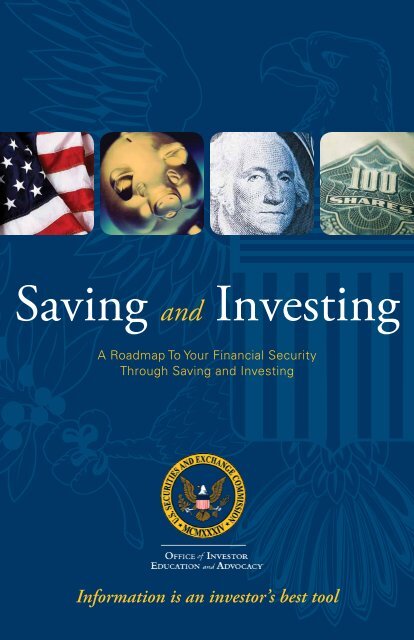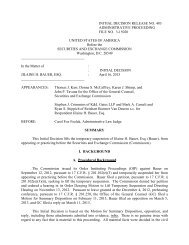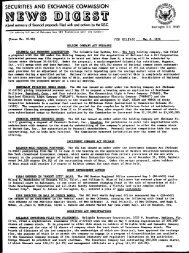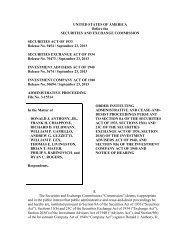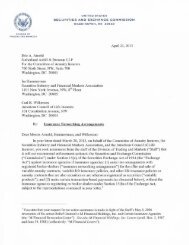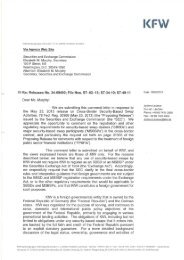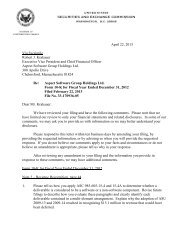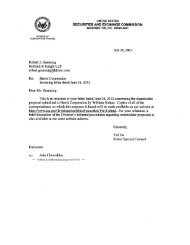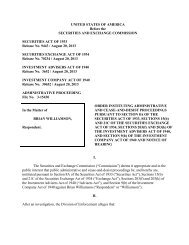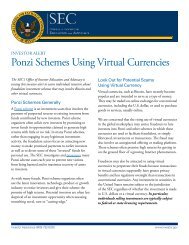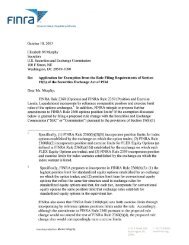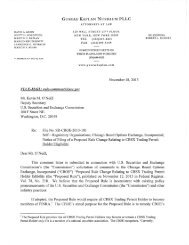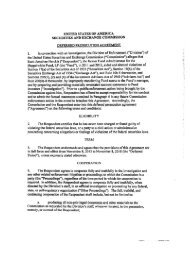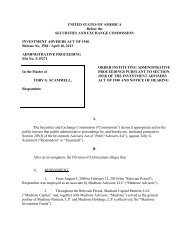Saving and Investing - Securities and Exchange Commission
Saving and Investing - Securities and Exchange Commission
Saving and Investing - Securities and Exchange Commission
Create successful ePaper yourself
Turn your PDF publications into a flip-book with our unique Google optimized e-Paper software.
<strong>Saving</strong> <strong>and</strong> <strong>Investing</strong><br />
A Roadmap To Your Financial Security<br />
Through <strong>Saving</strong> <strong>and</strong> <strong>Investing</strong><br />
Information is an investor’s best tool<br />
A ROADMAP TO YOUR JOURNEY TO FINANCIAL SECURITY | 1
2 | SAVING AND INVESTING
Dear Reader<br />
While money doesn’t grow on trees, it can grow when<br />
you save <strong>and</strong> invest wisely.<br />
Knowing how to secure your financial well-being is one<br />
of the most important things you’ll ever need in life. You<br />
don’t have to be a genius to do it. You just need to know<br />
a few basics, form a plan, <strong>and</strong> be ready to stick to it. No<br />
matter how much or little money you have, the important<br />
thing is to educate yourself about your opportunities. In<br />
this brochure, we’ll cover the basics on saving <strong>and</strong> investing.<br />
At the SEC, we enforce the laws that determine how investments<br />
are offered <strong>and</strong> sold to you. These laws protect investors,<br />
but you need to do your part, too. Part of this brochure<br />
tells you how to check out investments <strong>and</strong> the people that<br />
sell them so you do not fall victim to fraud or costly mistakes.<br />
No one can guarantee that you’ll make money from<br />
investments you make. But if you get the facts about saving<br />
<strong>and</strong> investing <strong>and</strong> follow through with an intelligent<br />
plan, you should be able to gain financial security over<br />
the years <strong>and</strong> enjoy the benefits of managing your money.<br />
Please feel free to contact us with any of your questions<br />
or concerns about investing. It always pays to learn<br />
before you invest. And congratulations on taking your<br />
first step on the road to financial security!<br />
U.S. <strong>Securities</strong> <strong>and</strong> <strong>Exchange</strong> <strong>Commission</strong><br />
Office of Investor Education <strong>and</strong> Advocacy<br />
100 F Street, N.E.<br />
Washington, D.C. 20549-0213<br />
Toll-free: (800) SEC-0330<br />
Website: www.investor.gov<br />
A ROADMAP TO YOUR JOURNEY TO FINANCIAL SECURITY | 1
2 | SAVING AND INVESTING
Don’t Wait to Get Started<br />
YOU CAN DO IT!<br />
IT’S EASIER THAN YOU THINK.<br />
No one is born knowing how to save or to invest. Every successful<br />
investor starts with the basics—the information in this<br />
brochure.<br />
A few people may stumble into financial security—a wealthy<br />
relative may die, or a business may take off. But for most people,<br />
the only way to attain financial security is to save <strong>and</strong> invest<br />
over a long period of time.<br />
Time after time, people of even modest means who begin<br />
the journey reach financial security <strong>and</strong> all that it promises:<br />
buying a home, educational opportunities for their children,<br />
<strong>and</strong> a comfortable retirement. If they can do it, so can you!<br />
KEYS TO FINANCIAL SUCCESS<br />
1. Make a financial plan.<br />
2. Pay off any high interest debts.<br />
3. Start saving <strong>and</strong> investing as soon as you’ve paid off your debts.<br />
A ROADMAP TO YOUR JOURNEY TO FINANCIAL SECURITY | 3
Your First Step—Making a<br />
Financial Plan<br />
What are the things you want to save <strong>and</strong> invest for?<br />
• a home<br />
• a car<br />
• an education<br />
• a comfortable retirement<br />
• your children<br />
• medical or other emergencies<br />
• periods of unemployment<br />
• caring for parents<br />
Make your own list <strong>and</strong> then think about which goals are the<br />
most important to you. List your most important goals first.<br />
Decide how many years you have to meet each specific goal,<br />
because when you save or invest you’ll need to find a savings or<br />
4 | SAVING AND INVESTING<br />
YOUR FINANCIAL GOALS<br />
If you don’t know where you are going, you may end up somewhere you don’t want<br />
to be. To end up where you want to be, you’ll need a roadmap, a financial plan.<br />
What do you want to save or invest for? By when?<br />
1. ____________________________ _______<br />
2. ____________________________ _______<br />
3. ____________________________ _______<br />
4. ____________________________ _______<br />
5. ____________________________ _______
investment option that fits your time frame for meeting each goal.<br />
Many tools exist to help you put your financial plan together.<br />
You’ll find a wealth of information, including calculators <strong>and</strong><br />
links to non-commercial resources at www.investor.gov.<br />
KNOW YOUR CURRENT FINANCIAL SITUATION<br />
Sit down <strong>and</strong> take an honest look at your entire financial situation.<br />
You can never take a journey without knowing where<br />
you’re starting from, <strong>and</strong> a journey to financial security is no<br />
different. You’ll need to figure out on paper your current situation—what<br />
you own <strong>and</strong> what you owe. You’ll be creating a<br />
“net worth statement.” On one side of the page, list what you<br />
own. These are your “assets.” And on the other side list what<br />
you owe other people, your “liabilities” or debts.<br />
YOUR NET WORTH STATEMENT<br />
Assets Current Value Liabilities Amount<br />
Cash __________ Mortgage balance __________<br />
Checking accounts __________ Credit cards __________<br />
<strong>Saving</strong>s __________ Bank loans __________<br />
Cash value of life<br />
insurance<br />
__________ Car loans __________<br />
Retirement accounts __________ Student loans __________<br />
Real estate __________ Other __________<br />
Home __________ __________<br />
Other investments __________ __________<br />
Personal property __________ __________<br />
TOTAL __________ TOTAL __________<br />
A ROADMAP TO YOUR JOURNEY TO FINANCIAL SECURITY | 5
Subtract your liabilities from your assets. If your assets are larger<br />
than your liabilities, you have a “positive” net worth. If your liabilities<br />
are greater than your assets, you have a “negative” net worth.<br />
You’ll want to update your “net worth statement” every year<br />
to keep track of how you are doing. Don’t be discouraged if<br />
you have a negative net worth. If you follow a plan to get into<br />
a positive position, you’re doing the right thing.<br />
KNOW YOUR INCOME AND EXPENSES<br />
The next step is to keep track of your income <strong>and</strong> your expenses<br />
for every month. Write down what you <strong>and</strong> others in<br />
your family earn, <strong>and</strong> then your monthly expenses.<br />
PAY YOURSELF OR YOUR FAMILY FIRST<br />
Include a category for savings <strong>and</strong> investing. What are you<br />
paying yourself every month? Many people get into the habit<br />
of saving <strong>and</strong> investing by following this advice: always pay<br />
yourself or your family first. Many people find it easier to pay<br />
themselves first if they allow their bank to automatically remove<br />
money from their paycheck <strong>and</strong> deposit it into a savings<br />
or investment account.<br />
Likely even better, for tax purposes, is to participate in an<br />
employer-sponsored retirement plan such as a 401(k), 403(b),<br />
or 457(b). These plans will typically not only automatically deduct<br />
money from your paycheck, but will immediately reduce<br />
the taxes you are paying. Additionally, in many plans the employer<br />
matches some or all of your contribution. When your<br />
employer does that, it’s offering “free money.”<br />
Any time you have automatic deductions made from your<br />
paycheck or bank account, you’ll increase the chances of being<br />
able to stick to your plan <strong>and</strong> to realize your goals.<br />
6 | SAVING AND INVESTING
FINDING MONEY TO SAVE OR INVEST<br />
If you are spending all your income, <strong>and</strong> never have money to<br />
save or invest, you’ll need to look for ways to cut back on your<br />
expenses. When you watch where you spend your money, you<br />
will be surprised how small everyday expenses that you can do<br />
without add up over a year.<br />
KNOW YOUR INCOME AND WHAT YOU SPEND<br />
Monthly Income ________________<br />
Monthly Expenses<br />
<strong>Saving</strong>s ________________<br />
Investments ________________<br />
Housing ________________<br />
Rent or mortgage ________________<br />
Electricity ________________<br />
Gas/oil ________________<br />
Telephone ________________<br />
Water/sewer ________________<br />
Property tax ________________<br />
Furniture ________________<br />
Food ________________<br />
Transportation ________________<br />
Loans ________________<br />
Insurance ________________<br />
Education ________________<br />
Recreation ________________<br />
Child care ________________<br />
Health care ________________<br />
Gifts ________________<br />
Other ________________<br />
TOTAL ________________<br />
A ROADMAP TO YOUR JOURNEY TO FINANCIAL SECURITY | 7
Small <strong>Saving</strong>s Add Up<br />
to Big Money<br />
How much does a cup of coffee cost you?<br />
If you buy a cup of coffee every day for $1.00 (an awfully good price<br />
for a decent cup of coffee, nowadays), that adds up to $365.00 a year.<br />
If you saved that $365.00 for just one year, <strong>and</strong> put it into a savings<br />
account or investment that earns 5% a year, it would grow to $465.84<br />
by the end of 5 years, <strong>and</strong> by the end of 30 years, to $1,577.50.<br />
That’s the power of “compounding.” With compound interest, you<br />
earn interest on the money you save <strong>and</strong> on the interest that money<br />
earns. Over time, even a small amount saved can add up to big money.<br />
If you are willing to watch what you spend <strong>and</strong> look for<br />
little ways to save on a regular schedule, you can make money<br />
grow. You just did it with one cup of coffee.<br />
If a small cup of coffee can make such a huge difference, start<br />
looking at how you could make your money grow if you decided<br />
to spend less on other things <strong>and</strong> save those extra dollars.<br />
If you buy on impulse, make a rule that you’ll always wait<br />
24 hours to buy anything. You may lose your desire to buy it<br />
after a day. And try emptying your pockets <strong>and</strong> wallet of spare<br />
change at the end of each day. You’ll be surprised how quickly<br />
those nickels <strong>and</strong> dimes add up!<br />
PAY OFF CREDIT CARD OR OTHER HIGH INTEREST<br />
DEBT<br />
Speaking of things adding up, few investment strategies pay off as<br />
well as, or with less risk than, merely paying off all high interest<br />
debt you may have.<br />
Many people have wallets filled with credit cards, some of<br />
which they’ve “maxed out” (meaning they’ve spent up to their<br />
8 | SAVING AND INVESTING
credit limit). Credit cards can make it seem easy to buy expensive<br />
things when you don’t have the cash in your pocket—or in the<br />
bank. But credit cards aren’t free money.<br />
Most credit cards charge high interest rates—as much as 18<br />
percent or more—if you don’t pay off your balance in full each<br />
month. If you owe money on your credit cards, the wisest thing<br />
you can do is pay off the balance in full as quickly as possible. Virtually<br />
no investment will give you the high returns you’ll need to<br />
keep pace with an 18 percent interest charge. That’s why you’re<br />
better off eliminating all credit card debt before investing savings.<br />
Once you’ve paid off your credit cards, you can budget your<br />
money <strong>and</strong> begin to save <strong>and</strong> invest. Here are some tips for<br />
avoiding credit card debt:<br />
Put Away the Plastic<br />
Don’t use a credit card unless your debt is at a manageable level <strong>and</strong><br />
you know you’ll have the money to pay the bill when it arrives.<br />
Know What You Owe<br />
It’s easy to forget how much you’ve charged on your credit<br />
card. Every time you use a credit card, write down how much<br />
you have spent <strong>and</strong> figure out how much you’ll have to pay that<br />
month. If you know you won’t be able to pay your balance in<br />
full, try to figure out how much you can pay each month <strong>and</strong><br />
how long it’ll take to pay the balance in full.<br />
Pay Off the Card with the Highest Rate<br />
If you’ve got unpaid balances on several credit cards, you should<br />
first pay down the card that charges the highest rate. Pay as much<br />
as you can toward that debt each month until your balance is once<br />
again zero, while still paying the minimum on your other cards.<br />
The same advice goes for any other high interest debt (about 8% or<br />
above) which does not offer the tax advantages of, for example, a mortgage.<br />
Now, once you have paid off those credit cards <strong>and</strong> begun to<br />
set aside some money to save <strong>and</strong> invest, what are your choices?<br />
A ROADMAP TO YOUR JOURNEY TO FINANCIAL SECURITY | 9
Making Money Grow<br />
THE TWO WAYS TO MAKE MONEY<br />
There are basically two ways to make money.<br />
1.You work for money.<br />
Someone pays you to work for them or you have your own<br />
business.<br />
2.Your money works for you.<br />
You take your money <strong>and</strong> you save or invest it.<br />
YOUR MONEY CAN WORK FOR YOU IN TWO WAYS<br />
Your money earns money. When your money goes to work,<br />
it may earn a steady paycheck. Someone pays you to use your<br />
money for a period of time. When you get your money back,<br />
you get it back plus “interest.” Or, if you buy stock in a company<br />
that pays “dividends” to shareholders, the company may pay<br />
you a portion of its earnings on a regular basis. Your money can<br />
make an “income,” just like you. You can make more money<br />
when you <strong>and</strong> your money work.<br />
You buy something with your money that could increase<br />
in value. You become an owner of something that you<br />
hope increases in value over time. When you need your money<br />
back, you sell it, hoping someone else will pay you more for it. For<br />
instance, you buy a piece of l<strong>and</strong> thinking it will increase in value<br />
as more businesses or people move into your town. You expect to<br />
sell the l<strong>and</strong> in five, ten, or twenty years when someone will buy<br />
it from you for a lot more money than you paid.<br />
And sometimes, your money can do both at the same time—<br />
earn a steady paycheck <strong>and</strong> increase in value.<br />
10 | SAVING AND INVESTING
THE DIFFERENCES BETWEEN SAVING AND INVESTING<br />
<strong>Saving</strong><br />
Your “savings” are usually put into the safest places, or products,<br />
that allow you access to your money at any time. <strong>Saving</strong>s<br />
products include savings accounts, checking accounts, <strong>and</strong><br />
certificates of deposit. Some deposits in these products may be<br />
insured by the Federal Deposit Insurance Corporation or the<br />
National Credit Union Administration. But there’s a tradeoff<br />
for security <strong>and</strong> ready availability. Your money is paid a low<br />
wage as it works for you.<br />
After paying off credit cards or other high interest debt,<br />
most smart investors put enough money in a savings product to<br />
cover an emergency, like sudden unemployment. Some make<br />
sure they have up to six months of their income in savings so<br />
that they know it will absolutely be there for them when they<br />
need it.<br />
But how “safe” is a savings account if you leave all of your<br />
money there for a long time, <strong>and</strong> the interest it earns doesn’t<br />
keep up with inflation? What if you save a dollar when it can<br />
buy a loaf of bread. But years later when you withdraw that<br />
dollar plus the interest you earned on it, it can only buy half<br />
a loaf? This is why many people put some of their money in<br />
savings, but look to investing so they can earn more over long<br />
periods of time, say three years or longer.<br />
<strong>Investing</strong><br />
When you “invest,” you have a greater chance of losing your<br />
money than when you “save.” The money you invest in securities,<br />
mutual funds, <strong>and</strong> other similar investments typically<br />
is not federally insured. You could lose your “principal”—the<br />
amount you’ve invested. But you also have the opportunity to<br />
earn more money.<br />
A ROADMAP TO YOUR JOURNEY TO FINANCIAL SECURITY | 11
12 | SAVING AND INVESTING<br />
THE BASIC TYPES OF PRODUCTS<br />
<strong>Saving</strong>s Investments<br />
<strong>Saving</strong>s accounts Bonds<br />
Certificates of deposit Stocks<br />
Checking accounts Mutual funds<br />
What about risk?<br />
Real estate<br />
Commodities (gold, silver, etc.)<br />
All investments involve taking on risk. It’s important that you<br />
go into any investment in stocks, bonds or mutual funds with a<br />
full underst<strong>and</strong>ing that you could lose some or all of your money<br />
in any one investment. While over the long term the stock market<br />
has historically provided around 10% annual returns (closer to 6%<br />
or 7% “real” returns when you subtract for the effects of inflation),<br />
the long term does sometimes take a rather long, long time to play<br />
out. Those who invested all of their money in the stock market at<br />
its peak in 1929 (before the stock market crash) would wait over<br />
20 years to see the stock market return to the same level.<br />
However, those that kept adding money to the market<br />
throughout that time would have done very well for themselves,<br />
as the lower cost of stocks in the 1930s made for some<br />
hefty gains for those who bought <strong>and</strong> held over the course of<br />
the next twenty years or more.<br />
It is often said that the greater the risk, the greater the potential<br />
reward in investing, but taking on unnecessary risk is<br />
often avoidable. Investors best protect themselves against risk<br />
by spreading their money among various investments, hoping<br />
that if one investment loses money, the other investments will<br />
more than make up for those losses. This strategy, called “di-
versification,” can be neatly summed up as, “Don’t put all your<br />
eggs in one basket.” Investors also protect themselves from<br />
the risk of investing all their money at the wrong time (think<br />
1929) by following a consistent pattern of adding new money<br />
to their investments over long periods of time.<br />
Once you’ve saved money for investing, consider carefully all<br />
your options <strong>and</strong> think about what diversification strategy makes<br />
sense for you. While the SEC cannot recommend any particular<br />
investment product, you should know that a vast array of investment<br />
products exists—including stocks <strong>and</strong> stock mutual funds,<br />
corporate <strong>and</strong> municipal bonds, bond mutual funds, certificates<br />
of deposit, money market funds, <strong>and</strong> U.S. Treasury securities.<br />
Diversification can’t guarantee that your investments won’t<br />
suffer if the market drops. But it can improve the chances that<br />
you won’t lose money, or that if you do, it won’t be as much as<br />
if you weren’t diversified.<br />
What are the best investments for me?<br />
The answer depends on when you will need the money,<br />
your goals, <strong>and</strong> if you will be able to sleep at night if you purchase<br />
a risky investment where you could lose your principal.<br />
For instance, if you are saving for retirement, <strong>and</strong> you have<br />
35 years before you retire, you may want to consider riskier<br />
investment products, knowing that if you stick to only the “savings”<br />
products or to less risky investment products, your money<br />
will grow too slowly—or, given inflation <strong>and</strong> taxes, you may<br />
lose the purchasing power of your money. A frequent mistake<br />
people make is putting money they will not need for a very<br />
long time in investments that pay a low amount of interest.<br />
On the other h<strong>and</strong>, if you are saving for a short-term goal,<br />
five years or less, you don’t want to choose risky investments,<br />
because when it’s time to sell, you may have to take a loss. Since<br />
investments often move up <strong>and</strong> down in value rapidly, you want<br />
to make sure that you can wait <strong>and</strong> sell at the best possible time.<br />
A ROADMAP TO YOUR JOURNEY TO FINANCIAL SECURITY | 13
What are investments all about?<br />
When you make an investment, you are giving your money<br />
to a company or enterprise, hoping that it will be successful<br />
<strong>and</strong> pay you back with even more money.<br />
Stocks <strong>and</strong> Bonds<br />
Many companies offer investors the opportunity to buy either<br />
stocks or bonds. The example below shows you how stocks <strong>and</strong><br />
bonds differ.<br />
Let’s say you believe that a company that makes automobiles<br />
may be a good investment. Everyone you know is buying<br />
one of its cars, <strong>and</strong> your friends report that the company’s cars<br />
rarely break down <strong>and</strong> run well for years. You either have an<br />
investment professional investigate the company <strong>and</strong> read as<br />
much as possible about it, or you do it yourself.<br />
After your research, you’re convinced it’s a solid company<br />
that will sell many more cars in the years ahead.<br />
The automobile company offers both stocks <strong>and</strong> bonds. With the<br />
bonds, the company agrees to pay you back your initial investment<br />
in ten years, plus pay you interest twice a year at the rate of 8% a year.<br />
If you buy the stock, you take on the risk of potentially losing<br />
a portion or all of your initial investment if the company<br />
does poorly or the stock market drops in value. But you also<br />
may see the stock increase in value beyond what you could<br />
earn from the bonds. If you buy the stock, you become an<br />
“owner” of the company.<br />
You wrestle with the decision. If you buy the bonds, you<br />
will get your money back plus the 8% interest a year. And you<br />
think the company will be able to honor its promise to you on<br />
the bonds because it has been in business for many years <strong>and</strong><br />
doesn’t look like it could go bankrupt. The company has a long<br />
history of making cars <strong>and</strong> you know that its stock has gone<br />
up in price by an average of 9% a year, plus it has typically paid<br />
stockholders a dividend of 3% from its profits each year.<br />
14 | SAVING AND INVESTING
THE MAIN DIFFERENCES BETWEEN<br />
STOCKS AND BONDS<br />
Stocks Bonds<br />
If the company profits or is perceived as The company promises to return money<br />
having strong potential, its stock may go<br />
up in value <strong>and</strong> pay dividends. You may<br />
make more money than from the bonds.<br />
plus interest.<br />
Risk: The company may do poorly, <strong>and</strong> Risk: If the company goes bankrupt,<br />
you’ll lose a portion or all of your invest- your money may be lost. But if there is<br />
ment. any money left, you will be paid before<br />
stockholders.<br />
You take your time <strong>and</strong> make a careful decision. Only time<br />
will tell if you made the right choice. You’ll keep a close eye on<br />
the company <strong>and</strong> keep the stock as long as the company keeps<br />
selling a quality car that consumers want to drive, <strong>and</strong> it can<br />
make an acceptable profit from its sales.<br />
WHY SOME INVESTMENTS MAKE MONEY<br />
AND OTHERS DON’T<br />
You can potentially make money in an investment if:<br />
• The company performs better than its competitors.<br />
• Other investors recognize it’s a good company, so that when it<br />
comes time to sell your investment, others want to buy it.<br />
• The company makes profits, meaning they make enough money to<br />
pay you interest for your bond, or maybe dividends on your stock.<br />
You can lose money if:<br />
• The company’s competitors are better than it is.<br />
• Consumers don’t want to buy the company’s products or services.<br />
• The company’s officers fail at managing the business well, they spend<br />
too much money, <strong>and</strong> their expenses are larger than their profits.<br />
A ROADMAP TO YOUR JOURNEY TO FINANCIAL SECURITY | 15
• Other investors that you would need to sell to think the company’s<br />
stock is too expensive given its performance <strong>and</strong> future outlook.<br />
• The people running the company are dishonest. They use your<br />
money to buy homes, clothes, <strong>and</strong> vacations, instead of using your<br />
money on the business.<br />
• They lie about any aspect of the business: claim past or future profits<br />
that do not exist, claim it has contracts to sell its products when<br />
it doesn’t, or make up fake numbers on their finances to dupe<br />
investors.<br />
• The brokers who sell the company’s stock manipulate the price<br />
so that it doesn’t reflect the true value of the company. After they<br />
pump up the price, these brokers dump the stock, the price falls,<br />
<strong>and</strong> investors lose their money.<br />
• For whatever reason, you have to sell your investment when the<br />
market is down.<br />
MUTUAL FUNDS<br />
Because it is sometimes hard for investors to become experts<br />
on various businesses—for example, what are the best steel,<br />
automobile, or telephone companies—investors often depend<br />
on professionals who are trained to investigate companies <strong>and</strong><br />
recommend companies that are likely to succeed. Since it takes<br />
work to pick the stocks or bonds of the companies that have<br />
the best chance to do well in the future, many investors choose<br />
to invest in mutual funds.<br />
What is a mutual fund?<br />
A mutual fund is a pool of money run by a professional<br />
or group of professionals called the “investment adviser.” In a<br />
managed mutual fund, after investigating the prospects of many<br />
companies, the fund’s investment adviser will pick the stocks<br />
16 | SAVING AND INVESTING
or bonds of companies <strong>and</strong> put them into a fund.<br />
Investors can buy shares of the fund, <strong>and</strong> their shares rise or<br />
fall in value as the values of the stocks <strong>and</strong> bonds in the fund<br />
rise <strong>and</strong> fall. Investors may typically pay a fee when they buy or<br />
sell their shares in the fund, <strong>and</strong> those fees in part pay the salaries<br />
<strong>and</strong> expenses of the professionals who manage the fund.<br />
Even small fees can <strong>and</strong> do add up <strong>and</strong> eat into a significant<br />
chunk of the returns a mutual fund is likely to produce, so you<br />
need to look carefully at how much a fund costs <strong>and</strong> think about<br />
how much it will cost you over the amount of time you plan to<br />
own its shares. If two funds are similar in every way except that<br />
one charges a higher fee than the other, you’ll make more money<br />
by choosing the fund with the lower annual costs.<br />
For more information about mutual fund fees <strong>and</strong> expenses,<br />
be sure to read our brochure entitled “Invest Wisely: An Introduction<br />
to Mutual Funds”—which you can read online at www.<br />
sec.gov/investor/pubs/inwsmf.htm or order for free by calling<br />
(800) SEC-0330.<br />
MUTUAL FUNDS WITHOUT ACTIVE MANAGEMENT<br />
One way that investors can obtain for themselves nearly the<br />
full returns of the market is to invest in an “index fund.” This is<br />
a mutual fund that does not attempt to pick <strong>and</strong> choose stocks<br />
of individual companies based upon the research of the mutual<br />
fund managers or to try to time the market’s movements.<br />
An index fund seeks to equal the returns of a major stock index,<br />
such as the St<strong>and</strong>ard & Poor’s 500, the Wilshire 5000, or<br />
the Russell 3000. Through computer programmed buying <strong>and</strong><br />
selling, an index fund tracks the holdings of a chosen index,<br />
<strong>and</strong> so shows the same returns as an index minus, of course, the<br />
annual fees involved in running the fund. The fees for index<br />
mutual funds generally are much lower than the fees for managed<br />
mutual funds.<br />
A ROADMAP TO YOUR JOURNEY TO FINANCIAL SECURITY | 17
Historical data shows that index funds have, primarily because<br />
of their lower fees, enjoyed higher returns than the average<br />
managed mutual fund. But, like any investment, index<br />
funds involve risk.<br />
WATCH “TURNOVER” TO AVOID PAYING EXCESS TAXES<br />
To maximize your mutual fund returns, or any investment returns,<br />
know the effect that taxes can have on what actually<br />
ends up in your pocket. Mutual funds that trade quickly in<br />
<strong>and</strong> out of stocks will have what is known as “high turnover.”<br />
While selling a stock that has moved up in price does lock in<br />
a profit for the fund, this is a profit for which taxes have to be<br />
paid. Turnover in a fund creates taxable capital gains, which are<br />
paid by the mutual fund shareholders. All mutual funds are now<br />
m<strong>and</strong>ated by the SEC to show both their before- <strong>and</strong> aftertax<br />
returns. The differences between what a fund is reportedly<br />
earning, <strong>and</strong> what a fund is earning after taxes are paid on the<br />
dividends <strong>and</strong> capital gains, can be quite striking. If you plan to<br />
hold mutual funds in a taxable account, be sure to check out<br />
these historical returns in the mutual fund prospectus to see<br />
what kind of taxes you might be likely to incur.<br />
Do I Need an Investment Professional?<br />
Are you the type of person who will read as much as possible<br />
about potential investments <strong>and</strong> ask questions about them? If<br />
so, maybe you don’t need investment advice. But if you’re busy<br />
with your job, your children, or other responsibilities, or feel<br />
you don’t know enough about investing on your own, then you<br />
may need professional investment advice.<br />
18 | SAVING AND INVESTING
WARNING!<br />
Before You Invest Always Check with the SEC <strong>and</strong> Your State’s<br />
<strong>Securities</strong> Regulator:<br />
Is the investment registered?<br />
Have investors complained about the investment in the past?<br />
Have the people who own or manage the investment been in trouble in the past?<br />
Is the person selling me this investment licensed in my state?<br />
Has that person been in trouble with the SEC, my state, or other investors in the past?<br />
Investment professionals offer a variety of services at a variety<br />
of prices. It pays to comparison shop. You can get investment<br />
advice from most financial institutions that sell investments,<br />
including brokerages, banks, mutual funds, <strong>and</strong> insurance companies.<br />
You can also hire a broker, an investment adviser, an accountant,<br />
a financial planner, or other professional to help you<br />
make investment decisions.<br />
Some financial planners <strong>and</strong> investment advisers offer a<br />
complete financial plan, assessing every aspect of your financial<br />
life <strong>and</strong> developing a detailed strategy for meeting your financial<br />
goals. They may charge you a fee for the plan, a percentage<br />
of your assets that they manage, or receive commissions from<br />
the companies whose products you buy, or a combination of<br />
these. You should know exactly what services you are getting<br />
<strong>and</strong> how much they will cost.<br />
Remember, there is no such thing as a free lunch. Professional<br />
financial advisers do not perform their services as an act<br />
of charity. If they are working for you, they are getting paid for<br />
their efforts. Some of their fees are easier to see immediately<br />
than are others. But, in all cases, you should always feel free to<br />
ask questions about how <strong>and</strong> how much your adviser is being<br />
paid. And if the fee is quoted to you as a percentage, make sure<br />
that you underst<strong>and</strong> what that translates to in dollars.<br />
A ROADMAP TO YOUR JOURNEY TO FINANCIAL SECURITY | 19
In contrast to investment advisers, brokers make recommendations<br />
about specific investments like stocks, bonds, or mutual<br />
funds. While taking into account your overall financial goals,<br />
brokers generally do not give you a detailed financial plan.<br />
Brokers are generally paid commissions when you buy or sell<br />
securities through them. If they sell you mutual funds make<br />
sure to ask questions about what fees are included in the mutual<br />
fund purchase.<br />
Brokerages vary widely in the quantity <strong>and</strong> quality of the services<br />
they provide for customers. Some have large research staffs,<br />
large national operations, <strong>and</strong> are prepared to service almost any<br />
kind of financial transaction you may need. Others are small <strong>and</strong><br />
may specialize in promoting investments in unproven <strong>and</strong> very<br />
risky companies. And there’s everything else in between.<br />
A discount brokerage charges lower fees <strong>and</strong> commissions<br />
for its services than what you’d pay at a full-service brokerage.<br />
But generally you have to research <strong>and</strong> choose investments by<br />
yourself. A full-service brokerage costs more, but the higher<br />
fees <strong>and</strong> commissions pay for a broker’s investment advice<br />
based on that firm’s research.<br />
The best way to choose an investment professional is to start<br />
by asking your friends <strong>and</strong> colleagues who they recommend.<br />
Try to get several recommendations, <strong>and</strong> then meet with potential<br />
advisers face-to-face. Make sure you get along. Make<br />
sure you underst<strong>and</strong> each other. After all, it’s your money.<br />
OPENING A BROKERAGE ACCOUNT<br />
When you open a brokerage account, whether in person or online,<br />
you will typically be asked to sign a new account agreement.<br />
You should carefully review all the information in this agreement<br />
because it determines your legal rights regarding your account.<br />
Do not sign the new account agreement unless you thoroughly<br />
underst<strong>and</strong> it <strong>and</strong> agree with the terms <strong>and</strong> conditions<br />
20 | SAVING AND INVESTING
it imposes on you. Do not rely on statements about your account<br />
that are not in this agreement. Ask for a copy of any account<br />
documentation prepared for you by your broker.<br />
The broker should ask you about your investment goals <strong>and</strong><br />
personal financial situation, including your income, net worth,<br />
investment experience, <strong>and</strong> how much risk you are willing to<br />
take on. Be honest. The broker relies on this information to<br />
determine which investments will best meet your investment<br />
goals <strong>and</strong> tolerance for risk. If a broker tries to sell you an investment<br />
before asking you these questions, that’s a very bad<br />
sign. It signals that the broker has a greater interest in earning<br />
a commission than recommending an investment to you that<br />
meets your needs. The new account agreement requires that<br />
you make three critical decisions:<br />
1. Who will make the final decisions about what you buy <strong>and</strong> sell in<br />
your account?<br />
You will have the final say on investment decisions unless you<br />
give “discretionary authority” to your broker. Discretionary authority<br />
allows your broker to invest your money without consulting<br />
you about the price, the type of security, the amount,<br />
<strong>and</strong> when to buy or sell. Do not give discretionary authority to<br />
your broker without seriously considering the risks involved<br />
in turning control over your money to another person.<br />
2. How will you pay for your investments?<br />
Most investors maintain a “cash” account that requires payment<br />
in full for each security purchase. But if you open a<br />
“margin” account, you can buy securities by borrowing money<br />
from your broker for a portion of the purchase price. Be aware<br />
of the risks involved with buying stocks on margin. Beginning<br />
investors generally should not get started with a margin<br />
account. Make sure you underst<strong>and</strong> how a margin account<br />
works, <strong>and</strong> what happens in the worst case scenario before you<br />
agree to buy on margin. Unlike other loans, like for a car or a<br />
A ROADMAP TO YOUR JOURNEY TO FINANCIAL SECURITY | 21
home, that allow you to pay back a fixed amount every month,<br />
when you buy stocks on margin you can be faced with paying<br />
back the entire margin loan all at once if the price of the stock<br />
drops suddenly <strong>and</strong> dramatically. The firm has the authority to<br />
immediately sell any security in your account, without notice<br />
to you, to cover any shortfall resulting from a decline in the<br />
value of your securities. You may owe a substantial amount of<br />
money even after your securities are sold. The margin account<br />
agreement generally provides that the securities in your margin<br />
account may be lent out by the brokerage firm at any time<br />
without notice or compensation to you.<br />
3. How much risk should you assume?<br />
In a new account agreement, you must specify your overall<br />
investment objective in terms of risk. Categories of risk may<br />
have labels such as “income,” “growth,” or “aggressive growth.”<br />
Be certain that you fully underst<strong>and</strong> the distinctions among<br />
these terms, <strong>and</strong> be certain that the risk level you choose accurately<br />
reflects your age, experience <strong>and</strong> investment goals. Be<br />
sure that the investment products recommended to you reflect<br />
the category of risk you have selected.<br />
When opening a new account, the brokerage firm may ask<br />
you to sign a legally binding contract to use the arbitration<br />
process to settle any future dispute between you <strong>and</strong> the firm<br />
or your sales representative. Signing this agreement means that<br />
you give up the right to sue your sales representative <strong>and</strong> firm<br />
in court.<br />
22 | SAVING AND INVESTING
How Can I Protect Myself?<br />
ASK QUESTIONS!<br />
You can never ask a dumb question about your investments<br />
<strong>and</strong> the people who help you choose them, especially when<br />
it comes to how much you will be paying for any investment,<br />
both in upfront costs <strong>and</strong> ongoing management fees.<br />
Here are some questions you should ask when choosing an<br />
investment professional or someone to help you:<br />
• What training <strong>and</strong> experience do you have? How long have you<br />
been in business?<br />
• What is your investment philosophy? Do you take a lot of risks or<br />
are you more concerned about the safety of my money?<br />
• Describe your typical client. Can you provide me with references,<br />
the names of people who have invested with you for a long time?<br />
• How do you get paid? By commission? Based on a percentage of<br />
assets you manage? Another method? Do you get paid more for<br />
selling your own firm’s products?<br />
• How much will it cost me in total to do business with you?<br />
Your investment professional should underst<strong>and</strong> your investment<br />
goals, whether you’re saving to buy a home, paying for<br />
your children’s education, or enjoying a comfortable retirement.<br />
Your investment professional should also underst<strong>and</strong> your<br />
tolerance for risk. That is, how much money can you afford<br />
to lose if the value of one of your investments declines? An<br />
investment professional has a duty to make sure that he or<br />
she only recommends investments that are suitable for you.<br />
That is, that the investment makes sense for you based on your<br />
other securities holdings, your financial situation, your means,<br />
A ROADMAP TO YOUR JOURNEY TO FINANCIAL SECURITY | 23
<strong>and</strong> any other information that your investment professional<br />
thinks is important. The best investment professional is one<br />
who fully underst<strong>and</strong>s your objectives <strong>and</strong> matches investment<br />
recommendations to your goals. You’ll want someone you can<br />
underst<strong>and</strong>, because your investment professional should teach<br />
you about investing <strong>and</strong> the investment products.<br />
How Should I Monitor My Investments?<br />
<strong>Investing</strong> makes it possible for your money to work for you.<br />
In a sense, your money has become your employee, <strong>and</strong> that<br />
makes you the boss. You’ll want to keep a close watch on how<br />
your employee, your money, is doing.<br />
Some people like to look at the stock quotations every day<br />
to see how their investments have done. That’s probably too<br />
often. You may get too caught up in the ups <strong>and</strong> downs of the<br />
“trading” value of your investment, <strong>and</strong> sell when its value<br />
goes down temporarily—even though the performance of the<br />
company is still stellar. Remember, you’re in for the long haul.<br />
Some people prefer to see how they’re doing once a year.<br />
That’s probably not often enough. What’s best for you will<br />
most likely be somewhere in between, based on your goals <strong>and</strong><br />
your investments.<br />
But it’s not enough to simply check an investment’s performance.<br />
You should compare that performance against an index<br />
of similar investments over the same period of time to see if<br />
you are getting the proper returns for the amount of risk that<br />
you are assuming. You should also compare the fees <strong>and</strong> commissions<br />
that you’re paying to what other investment professionals<br />
charge.<br />
While you should monitor performance regularly, you should<br />
pay close attention every time you send your money somewhere<br />
else to work.<br />
Every time you buy or sell an investment you will receive a<br />
confirmation slip from your broker. Make sure each trade was<br />
24 | SAVING AND INVESTING
IMPORTANT CONTACTS<br />
SEC NASAA<br />
100 F Street, N.E. 750 First Street, N.E., Suite 1140<br />
Washington, D.C. 20549-0213 Washington, D.C. 20002<br />
Toll-free: (800) SEC-0330 Phone: (202) 737-0900<br />
Website: www.investor.gov Website: www.nasaa.org<br />
completed according to your instructions. Make sure the buying<br />
or selling price was what your broker quoted. And make<br />
sure the commissions or fees are what your broker said they<br />
would be.<br />
Watch out for unauthorized trades in your account. If you<br />
get a confirmation slip for a transaction that you didn’t approve<br />
beforeh<strong>and</strong>, call your broker. It may have been a mistake. If<br />
your broker refuses to correct it, put your complaint in writing<br />
<strong>and</strong> send it to the firm’s compliance officer. Serious complaints<br />
should always be made in writing.<br />
Remember, too, that if you rely on your investment professional<br />
for advice, he or she has an obligation to recommend<br />
investments that match your investment goals <strong>and</strong> tolerance<br />
for risk. Your investment professional should not be recommending<br />
trades simply to generate commissions. That’s called<br />
“churning,” <strong>and</strong> it’s illegal.<br />
How Can I Avoid Problems?<br />
Choosing someone to help you with your investments is one<br />
of the most important investment decisions you will ever make.<br />
While most investment professionals are honest <strong>and</strong> hardworking,<br />
you must watch out for those few unscrupulous individuals.<br />
They can make your life’s savings disappear in an instant.<br />
<strong>Securities</strong> regulators <strong>and</strong> law enforcement officials can <strong>and</strong><br />
do catch these criminals. But putting them in jail doesn’t always<br />
get your money back. Too often, the money is gone. The good<br />
news is you can avoid potential problems by protecting yourself.<br />
A ROADMAP TO YOUR JOURNEY TO FINANCIAL SECURITY | 25
Let’s say you’ve already met with several investment professionals<br />
based on recommendations from friends <strong>and</strong> others you<br />
trust, <strong>and</strong> you’ve found someone who clearly underst<strong>and</strong>s your<br />
investment objectives. Before you hire this person, you still<br />
have more homework.<br />
Make sure the investment professional <strong>and</strong> her firm are registered<br />
with the SEC <strong>and</strong> licensed to do business in your state.<br />
And find out from your state’s securities regulator whether<br />
the investment professional or her firm have ever been disciplined,<br />
or whether they have any complaints against them.<br />
You’ll find contact information for securities regulators in the<br />
U.S. by visiting the website of the North American <strong>Securities</strong><br />
Administrators Association (NASAA) at www.nasaa.org or by<br />
calling (202) 737-0900.<br />
You should also find out as much as you can about any investments<br />
that your investment professional recommends.<br />
First, make sure the investments are registered. Keep in mind,<br />
however, the mere fact that a company has registered <strong>and</strong> files<br />
reports with the SEC doesn’t guarantee that the company will<br />
be a good investment.<br />
Likewise, the fact that a company hasn’t registered <strong>and</strong><br />
doesn’t file reports with the SEC doesn’t mean the company<br />
is a fraud. Still, you may be asking for serious losses if, for instance,<br />
you invest in a small, thinly traded company that isn’t<br />
widely known solely on the basis of what you may have read<br />
online. One simple phone call to your state regulator could<br />
prevent you from squ<strong>and</strong>ering your money on a scam.<br />
Be wary of promises of quick profits, offers to share “inside<br />
information,” <strong>and</strong> pressure to invest before you have an opportunity<br />
to investigate. These are all warning signs of fraud. Ask<br />
your investment professional for written materials <strong>and</strong> prospectuses,<br />
<strong>and</strong> read them before you invest. If you have questions,<br />
now is the time to ask.<br />
26 | SAVING AND INVESTING
• How will the investment make money?<br />
• How is this investment consistent with my investment goals?<br />
• What must happen for the investment to increase in value?<br />
• What are the risks?<br />
• Where can I get more information?<br />
Finally, it’s always a good idea to write down everything your<br />
investment professional tells you. Accurate notes will come in<br />
h<strong>and</strong>y if ever there’s a problem.<br />
Some investments make money. Others lose money. That’s<br />
natural, <strong>and</strong> that’s why you need a diversified portfolio to minimize<br />
your risk. But if you lose money because you’ve been<br />
cheated, that’s not natural, that’s a problem.<br />
Sometimes all it takes is a simple phone call to your investment<br />
professional to resolve a problem. Maybe there was<br />
an honest mistake that can be corrected. If talking to the investment<br />
professional doesn’t resolve the problem, talk to the<br />
firm’s manager, <strong>and</strong> write a letter to confirm your conversation.<br />
If that doesn’t lead to a resolution, you may have to initiate<br />
private legal action. You may need to take action quickly<br />
because legal time limits for doing so vary. Your local bar association<br />
can provide referrals for attorneys who specialize in<br />
securities law.<br />
At the same time, call or write to us <strong>and</strong> let us know what<br />
the problem was. Investor complaints are very important to the<br />
SEC. You may think you’re the only one experiencing a problem,<br />
but typically, you’re not alone. Sometimes it takes only one<br />
investor’s complaint to trigger an investigation that exposes a<br />
bad broker or an illegal scheme. Complaints can be filed online<br />
with us by going to www.sec.gov/complaint.shtml.<br />
A ROADMAP TO YOUR JOURNEY TO FINANCIAL SECURITY | 27
Keep in Touch With Us<br />
We hope that you’ve found this brochure helpful. Please let us<br />
know how it can be improved.<br />
We’ve only covered the basics, <strong>and</strong> there’s a lot more to learn<br />
about saving <strong>and</strong> investing. But you’ll be learning as you go <strong>and</strong><br />
over your lifetime.<br />
As we said at the beginning, the most important thing is to<br />
get started. And remember to ask questions as you make your<br />
investment decisions.<br />
Be sure to find out if the person is licensed to sell investments,<br />
<strong>and</strong> if the investment is registered with us. So, we look<br />
forward to hearing from you. And in the years ahead, let us<br />
know how well your money is growing.<br />
U.S. <strong>Securities</strong> <strong>and</strong> <strong>Exchange</strong> <strong>Commission</strong><br />
Office of Investor Education <strong>and</strong> Advocacy<br />
100 F Street, N.E.<br />
Washington, D.C. 20549-0213<br />
Toll-free: (800) SEC-0330<br />
Website: www.investor.gov<br />
To order a copy of this publication, please visit www.pueblo.gsa.gov.<br />
To order by phone, call the Federal Citizen Information Center at<br />
(888)878-3256 Monday-Friday 8am to 8pm ET.<br />
28 | <strong>Saving</strong> <strong>and</strong> inveSting
OFFICE of INVESTOR<br />
EDUCATION <strong>and</strong> ADVOCACY<br />
1-800-732-0330<br />
www.investor.gov<br />
SEC Pub. 009 (01/11)


